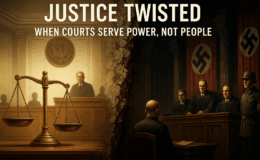In a significant legal development, Illinois inmates at the Will County Adult Detention Facility (WCADF) have achieved a partial victory in their ongoing battle for civil rights. A federal judge in Chicago ruled that several of the jail’s media and mail policies violate inmates’ constitutional rights. This decision marks a crucial step forward in the fight for the humane treatment and civil liberties of incarcerated individuals. In this article, we will delve into the details of this case, the policies in dispute, the court’s findings, and the broader implications for the rights of inmates.
The Policies in Dispute
The lawsuit challenged three specific policies at WCADF:
- The Sexual or Inappropriate Content Policy: This policy allows mailroom staff to ban photographs or other materials deemed to contain sexual or otherwise inappropriate content at their discretion.
- The Media Policy: This policy prohibits all materials printed from the internet, media articles, or pages torn from books or magazines.
- The P.O. Box Policy: This policy bans any mail to or from a person, publisher, or business with a P.O. Box return address, regardless of its contents or the identity of the sender.
Judicial Review and Initial Findings
U.S. District Judge LaShonda Hunt, appointed by President Joe Biden, reviewed these policies and found that they placed unconstitutional barriers on inmates’ access to certain forms of media and mail sent from P.O. Boxes. However, she upheld the jail’s ban on “sexual and inappropriate material.”
The Origins of the Case
The case originated in 2017 when a Will County inmate sued the jail after being denied mail due to the jail’s restrictive media policies. These restrictions included bans on newspapers, internet printouts, social media materials, and all mail from P.O. Box return addresses. Over nearly four years, the case evolved into a class action, gaining momentum in federal court.
Expansion of Claims
By September 2021, U.S. District Judge Andrea Wood, appointed by President Barack Obama, certified a class of current and future WCADF inmates affected by the media restrictions. The plaintiffs expanded their claims to challenge unreasonable delays in mail processing and the ban on sexual or other materials deemed inappropriate by mailroom staff.
Personal Testimonies
Inmates provided testimonies about the arbitrary enforcement of these policies. One inmate claimed that the jail used the “inappropriate” rule to confiscate pictures of his wife. Another inmate, who initiated the 2017 lawsuit, stated he was unfairly denied a book on the history of tattoos under the same rule.
The Turner Test and Judge Hunt’s Decision
Both the inmates and the jail moved for summary judgment, leading to Judge Hunt’s split decision. Judge Hunt applied the “Turner test,” a four-factor standard established by the 1987 Supreme Court case Turner v. Safley, to evaluate the prisoners’ claims. The Turner test assesses whether a prison regulation is justified and whether there are workable alternatives if a regulation negatively impacts prison staff or inmates.
Key Findings
Judge Hunt’s findings were as follows:
- Media Policy: The ban on internet materials and other media content was found to be unjustifiable. While the jail argued that the bans were necessary to prevent conflicts over personal beliefs, gang affiliations, and sexual preferences inferred from media consumption, Judge Hunt concluded that these security concerns did not outweigh the inmates’ rights. She noted that the jail could still review media that prisoners accessed, ensuring safety without infringing on constitutional rights.
- P.O. Box Policy: The ban on mail from P.O. Boxes was also found to be unconstitutional. Judge Hunt emphasized that this policy, as applied, violated inmates’ rights to receive religious literature, as mail from identifiable senders with P.O. Box addresses was still being denied.
- Provocative Mail Ban: The ban on inappropriate material was upheld, as Judge Hunt conceded that security interests outweigh prisoners’ First Amendment rights in this context. The regulation was broader than just banning sexual content; it included prohibitions on gang signs, symbols, graffiti, and other materials that could jeopardize the facility’s order and security.
Implications of the Decision
This ruling underscores the delicate balance between maintaining prison security and upholding inmates’ constitutional rights. Judge Hunt’s decision reaffirms that prison walls do not form a barrier separating inmates from constitutional protections, including the First Amendment.
Summary Judgment and its Effects
The summary judgment in favor of the plaintiffs signifies a pivotal moment for the rights of inmates at WCADF and potentially other facilities with similar policies. Judge Hunt stated, “without more evidence, Defendants fail to meet their burden of proving a compelling government interest and that their policy is the least restrictive means to further such an interest.” Consequently, the court granted summary judgment in favor of the plaintiffs regarding the Religious Land Use and Institutionalized Persons Act (RLUIPA) claim.
Broader Impact
This decision sets a precedent that could influence future cases involving inmate rights. It highlights the importance of scrutinizing prison policies to ensure they do not infringe upon fundamental rights without compelling justification. Inmates, despite their incarceration, retain their constitutional protections, and any limitations on these rights must be carefully justified and narrowly tailored.
Conclusion
The partial legal victory for Illinois inmates at WCADF is a testament to the enduring fight for civil rights within the criminal justice system. By challenging and overturning unconstitutional policies, this case emphasizes the necessity of maintaining a balance between security and individual rights. As the legal landscape continues to evolve, this ruling serves as a reminder that justice must be upheld for all, including those behind bars.
Final Thoughts
The road to justice and reintegration for incarcerated individuals is fraught with challenges. However, rulings like this provide hope and pave the way for a more equitable system. It is essential to continue advocating for the rights of inmates, ensuring that their dignity and constitutional protections are preserved. As we reflect on this victory, let us remain vigilant and committed to fostering a just and humane correctional system.



Leave a Comment